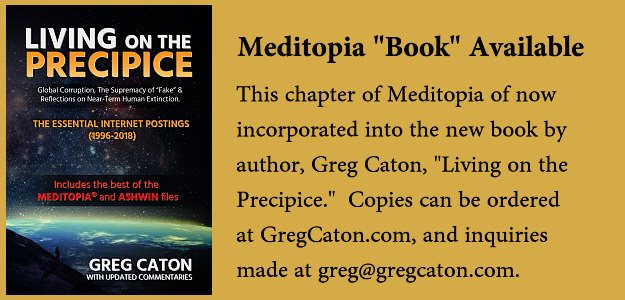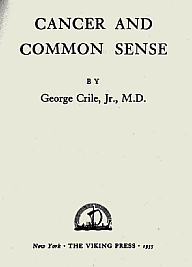 <
<
 >
>

Chapter 14:
Technological Development
In A Meditopia:
Protecting Lower
Entropy Technologies
 "Theuth, my paragon of inventors, the discoverer
of an art is not the best judge of the good or harm which
will accrue to those who practice it. So it is in this:
you, who are the father of writing, have out of fondness
for your offspring, attributed to it quite the opposite
of its real function. Those who acquire it will cease
to exercise their memory and become forgetful; they will
rely on writing to bring things to their remembrance
by external signs instead of by their own internal
resources. What you have discovered is a receipt for
recollection, not for memory. And as for wisdom, your
pupils will have the reputation for it without the reality:
they will receive a quantity of information without proper
instruction, and in consequence be thought very knowledgeable
when they are for the most part quite ignorant. And
because they are filled with the conceit of wisdom
instead of real wisdom they will be a burden to society."
"Theuth, my paragon of inventors, the discoverer
of an art is not the best judge of the good or harm which
will accrue to those who practice it. So it is in this:
you, who are the father of writing, have out of fondness
for your offspring, attributed to it quite the opposite
of its real function. Those who acquire it will cease
to exercise their memory and become forgetful; they will
rely on writing to bring things to their remembrance
by external signs instead of by their own internal
resources. What you have discovered is a receipt for
recollection, not for memory. And as for wisdom, your
pupils will have the reputation for it without the reality:
they will receive a quantity of information without proper
instruction, and in consequence be thought very knowledgeable
when they are for the most part quite ignorant. And
because they are filled with the conceit of wisdom
instead of real wisdom they will be a burden to society."
Plato
Phaedrus
 "Men have become tools of their tools . . ."
"Men have become tools of their tools . . ."
Henry David Thoreau
 "Information . . . information . . . information . . .
"Information . . . information . . . information . . .
where's the transformation?"
Babaji
 Famous saint and healer in southern India, upon
being asked what he thought of the internet
Famous saint and healer in southern India, upon
being asked what he thought of the internet
 he word "technology" has become
synonymous with "tool use," and in the battle between humanists
and scientists the word is essentially a catch-all for all
things exosomatic. The etymology of the word would suggest
that even its use has moved right on the exosomatic axis over
time -- for the word itself comes from the Greek "tekhnologia,"
roughly translating as "systematic treatment of an art or
craft." Its two root words are "teknhe," or skill; and
"logia," or study -- employing the art of reasoning.
 The very transformation
of the word tells us how our view of the world
has been transformed over time. When you think of
"skill," you normally think of the innate abilities of a man,
not his machine. You tend to think first of the inner
resources of the tool-creator and not the tool itself.
 Today, the very
word pays complete and unabashed homage to the glory of
the tool. Gone are the humans who created it.
Thoreau was right: we have become tools of
our tools.
 I begin with this
chapter on technology with a reassessment of what the
word means, because for our purposes, we will need to
think in more endosomatic terms. We will need to think
of "technology" with the center of gravity returning
to the inner man and not his tools. We will have
to return to our roots and, once again, realize
that the Creator is more important than the created;
the Giver the true embodiment of skill -- not his Gift;
and Mind the true fountain of advancement and not
the Matter it creates.
 The history of
technological development over the last 200 years
suggests that we have lost this wisdom to an
extreme degree. We have allowed those in the power
elite to suppress not just critically important
health care technologies -- most of them surprisingly
simple in nature. We have allowed technologies that
would have prevented the coming "high entropy"
collapse from ever occurring. In concluding
an overview of these suppressed technologies,
Gerry Vassilators was lead to pose the
question, "What were the twisted intrigues
which surrounded these deliberate convolutions
of history? . . . Ours is a world living hundreds
of years behind its intended stage of
development. Complete knowledge of this loss
is the key to recapturing this wonder technology."
 A thorough
study of Gerry's work demonstrates a common
thread that runs throughout -- one that parallels
my experiences with suppressed medical knowledge
that was central to Alpha Omega Labs.
That common thread is the motivation behind the
suppression: the desire to squash effective,
low entropy, low profit, relatively none proprietary,
more eco-friendly, less exosomatic technology,
so as to favor less effective, high entropy,
high profit, more proprietary, ecologically
damaging, more exosomatic technologies. The
degree of police force has, over time, become
more extreme and more outrageous -- to the point
where, as we saw in Chapter 3,
our civil rights are being quickly eroded to
support this continuing travesty -- one that
has and will continue to bring a horrific blight
to both man and the Earth.
 The development
and suppression of free energy (including Stubblefield's mastery
of "earth energy," Tesla's skills in bringing us
"broadcast power," and Farnsworth's perfection
of cold fusion) parallel the suppression of
effective health care technologies.
1
And so does the suppression of electrogravitic devices
for transportation.
2
And so does the suppression of earth-based,
wireless communications.
3
And so does the suppression of low entropy,
all natural, lighting systems.
4
 As a people
we could have obtained the promise of technology,
held onto our endosomatic roots, and worked in
harmony with the Earth. We choose instead to
let the power elite force us into the extreme
exosomatic, poison the Earth, and lead us down
a path of destruction. And for what? So that
a select few could make more money?
 With
the proper political and cultural infrastructure,
technology in harmony with nature is the result.
Technology works for the common man,
in harmony with nature, sustainably and
in accordance with good ecological practices,
allowing and encouraging his own inner
development.
- Gerry Vassilatos,
Lost Science,
Adventures Unlimited Press, Kempton, IL; 1999. See
chapters 3 (Stubblefield), 4 (Tesla), 7 (Brown).
- Ibid., see chapter 7 on Thomas Townsend Brown.
- Ibid., see chapters 2 (Meucci) and 3 (Stubblefield).
- Ibid., see chapter 6 (Moray).
- George Crile, Jr.,
Cancer and Common Sense,
The Viking Press, New York, 1955. Taken from Chapter IX, appropriately
entitled, "The Zone of Diminishing Returns," p. 79.
- Joseph A. Tainter,
The Collapse of Complex
Societies, Cambridge University Press, Cambridge, UK, 1988;
reprint: 2003; p. 93-108
- William R. Catton, Jr.,
Overshoot,
University of Illinois Press, Urbana/Chicago, IL; 1980;
Illini book edition: 1982.
|
Lost Science
 Galileo was
prosecuted in the 1530's for clinging
to the Copernican observation
that our Universe is not geocentric. Our
solar system is heliocentric -- and a tiny speck
in a vast universe at that. Today we live in a
culture that is money-centric. Power and
money are the sole celestial body around which
our culture's universe rotates. You don't really
get the sense of just how deep this principles runs
unless you spend time with books like Vasilatos's.

All the stories in this book are tear-at-the-heart
and make-you-weep stories
of how science and technology are suppressed when
they threaten the power elite. Three chapters in
particular focus on health care: Antonio Meucci
(Chapter 2), who was already treating customers
with effective bioenergetic techniques in 1848;
Nikola Tesla (Chapter 4), whose Tesla coil has
applications in health care that are being actively
suppressed in the U.S. even as you read these words.
(I know --- I worked extensively in this area as well).
Lastly, the story of Royal Raymond Rife, is covered
in Chapter 5. The most thorough treatment of Rife
is still attributed to
Lynes'
groundbreaking volume, but
Haley's
coverage is a good introduction to the subject.
As to style of presentation, I remain a Vasilatos
fan.

Dr. Crile
 Written in 1955 by
George Crile, Jr., M.D., Cancer and Common Sense,
was, for me, a psychological treasure trove of
explanations of various elements that keep the
"cancer myth" alive. Crile centers on the "fear
factor" that orthodox promotes, which cause people
to demand attemptive treatments at all cost.
It's technology for technology's sake:
" . . . we demand and accept many medical practices
whose value science cannot prove . . . Is it possible
that we have measured progress in terms of technics
instead of in terms of benefits given? Could we be
living still in an age of superstition? If so,
it is cancer that has become the king of all the
gods of fear.
 "Plato once said that all good things
tend to be destroyed by their own essential virtue.
This is another way of saying that a good idea can
be carried too far, that there is a
law of diminishing returns, that there is a point
beyond which further efforts bring no further increase
in return. The question is whether in the treatment
of cancer by known technics we have not already
reached that point. If we have, further expansion
of medical facilities, except for basic research,
would effect no significant increase in either
prevention or cure of cancer." 5
 Interestingly,
when Crile's thoughts are expanded beyond his
discipline (medicine), you get an amazingly
close description of Tainter's explanation
of why complex societies are vulnerable and
lead to collapse: their voracious appetites
for more resources fall square into the bear trap
set by biology to limit excess. Tainter calls
this "the marginal productivity of increasing complexity."
Ergo . . . too much exosomaticity.
6
Or, to use Catton's cyclical model:
resource drawdown, overshoot, crash
and die-off.
7
|

